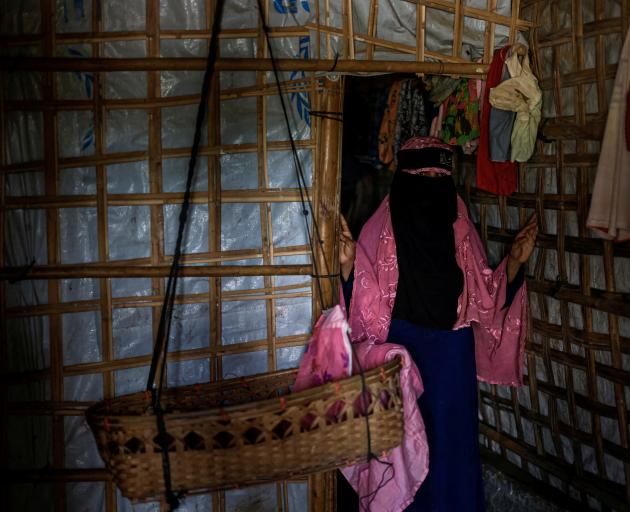Lifestyle
Funding Cuts Leave Rohingya Children Without Education in Bangladesh

Schools for Rohingya children in Cox’s Bazar, Bangladesh, have closed, leaving over 227,500 students without education. The suspension of educational services is part of a broader funding crisis affecting the Rohingya refugee population, which has grown to around 1.2 million since their displacement from Myanmar. This year marks the eighth anniversary of a mass exodus that United Nations investigations have classified as a “textbook example of ethnic cleansing.”
Impact of Funding Cuts on Refugee Education
The closure of schools has left many families scrambling. Begum, a mother of five, expressed her fears for her daughters’ futures. “Without school, girls sit idle. People start talking,” she said, with her youngest child tugging at her headscarf. With her husband’s mental health declining, she worries that early marriage may be the only option for her children, emphasizing her hope that any future husbands will allow them to study.
According to the UNHCR, critical funding for Rohingya services has decreased significantly. This year, the agency requires approximately $256 million to provide essential support but has received commitments for only about 38% of that total. The situation is exacerbated by a global humanitarian funding shortfall, with the UNHCR estimating it will receive just a third of the $10.6 billion needed to assist a growing number of displaced people worldwide.
Juliette Murekeyisoni, interim UNHCR Representative in Bangladesh, warned that without urgent support, essential services such as food assistance, health services, and education could collapse. UNICEF also reported suspending operations at over 4,500 schools in June, leading to a significant loss of education opportunities for Rohingya children.
Consequences for a Lost Generation
The ramifications of the closures are stark. Many children, like nine-year-old Nahima Bibi, now find themselves wandering the muddy lanes of the camp instead of attending classes. “If I don’t go to school, how will I ever become a doctor?” she asked, her voice filled with sadness. The International Rescue Committee (IRC) estimates that around 500,000 children currently lack access to education in Cox’s Bazar.
As educational opportunities dwindle, other alarming trends have emerged. Reports indicate that cases of child marriage have risen by 3%, while child labor has surged by 7%. Hasina Rahman, IRC’s Bangladesh director, noted that families are increasingly resorting to desperate measures for survival, which could lead to further abuses.
“Each day, more families will continue to turn to extreme methods of survival: gambling, selling children into marriage and forced labor, as well as sexual abuse will all rise,” Rahman stated. The ongoing crisis is deeply personal for many families, including Mohammed Faruq, who lamented, “Only a little bit of education our children could learn was snatched away.”
Faruq, who fled Myanmar in 2017, emphasized the dire situation, saying, “We survived genocide in Myanmar, we survived floods and fire here – but now our children’s future is being killed silently.” His concerns echo the sentiments of many families who feel trapped in a cycle of despair.
The education crisis threatens to undo years of fragile progress made in refugee camps. Kafayat Ullah, a math teacher in the camp, expressed his fears, stating, “I dreamed my students would become doctors or engineers. Now, with no classes, they will become nothing.”
UNICEF has attributed the funding crisis to shifting global priorities, resulting in reduced contributions to support the Rohingya. Rana Flowers, UNICEF Representative to Bangladesh, explained that they have streamlined operations and cut costs significantly, but the needs continue to outweigh available resources.
As the humanitarian situation deteriorates, the voices of Rohingya parents and children grow more urgent, highlighting the immediate need for international assistance to ensure that the next generation does not lose the opportunity for education and a brighter future.
-

 World4 months ago
World4 months agoTest Your Knowledge: Take the Herald’s Afternoon Quiz Today
-

 Sports4 months ago
Sports4 months agoPM Faces Backlash from Fans During Netball Trophy Ceremony
-

 Lifestyle4 months ago
Lifestyle4 months agoDunedin Designers Win Top Award at Hokonui Fashion Event
-

 Entertainment4 months ago
Entertainment4 months agoExperience the Excitement of ‘Chief of War’ in Oʻahu
-

 Sports4 months ago
Sports4 months agoLiam Lawson Launches New Era for Racing Bulls with Strong Start
-

 World5 months ago
World5 months agoCoalition Forms to Preserve Māori Wards in Hawke’s Bay
-

 Health4 months ago
Health4 months agoWalking Faster Offers Major Health Benefits for Older Adults
-

 Lifestyle4 months ago
Lifestyle4 months agoDisney Fan Reveals Dress Code Tips for Park Visitors
-

 Politics4 months ago
Politics4 months agoScots Rally with Humor and Music to Protest Trump’s Visit
-

 Top Stories5 months ago
Top Stories5 months agoUK and India Finalize Trade Deal to Boost Economic Ties
-

 Health2 months ago
Health2 months agoRadio Host Jay-Jay Feeney’s Partner Secures Visa to Stay in NZ
-

 World5 months ago
World5 months agoHuntly Begins Water Pipe Flushing to Resolve Brown Water Issue









